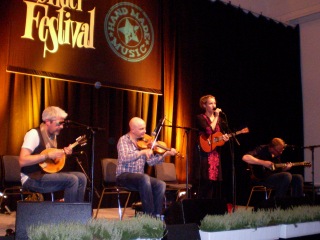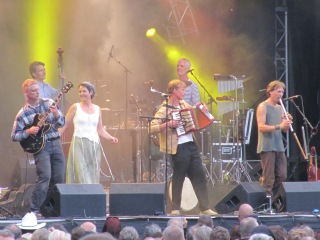FolkWorld #49 11/2012
A Ragged Kingdom
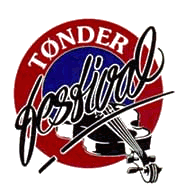 Tønder Festival
Tønder Festival
23-26 August 2012
Due to decreasing audiences in recent years, the Tønder Festival, held annually since 1975
in south west Denmark, underwent some major changes
in order to attract new audiences and ensure the festival's immediate future.
The festival brand is no longer
folk festivals like they used to be,
but
handmade music is our motto, folk roots our middle name.
Instead of a single concert on Thursday night and the official opening on Friday afternoon
at the marketplace, the festival already kicks off on Thursday with a series of concerts,
including artists such as
Oh My Darling [49],
Skerryvore [49]
and
Runrig [24].
The new concept requires wristbands to get access to the whole festival area
instead of purchasing tickets for single events.
This also means first-in, first-served, or you have to book in advance, respectively.
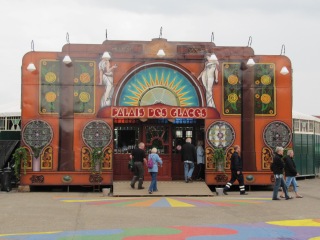
The festival's main site makes a good impression, it is open, wide-spaced, no queues in front of the two marquees.
While the two Tønder halls have been shut down,
there are new venues like a huge open-air arena catering for 5,000 spectators
(I see a middle-aged Dane with a
The Dawn of a New Age T-Shirt
running away from medieval rockers
Sorten Muld playing)
and a Belgian mirror tent (here's the only queue I encountered; this venue would be really perfect for
for quieter acts - similar to the Visemøllen).
With an altered timetable there is music until the early hours. The weekend brings us
Eliza Gilkyson [36],
The Bonny Men [47],
Hans Theessink [46],
David Francey [47],
I Draw Slow [46],
Ron Kavana [35],
Brian McNeill [42],
Le Vent du Nord [48],
Saw Doctors [29],
a Woody Guthrie tribute
[48]
ft.
Arlo Guthrie [34],
the
Blues Karavanen from the Aalborg Blues Festival
ft.
Tim Lothar [38],
the
Folk Spot Denmark presenting Danish folk and roots bands such as
Fiolministeriet [45],
Henrik Jansberg [48],
Hal & Nikolaj [49],
Phønix [39],
Basco [46]
and
Habadekuk [45],
and some pop and rock acts thrown in for good measure.
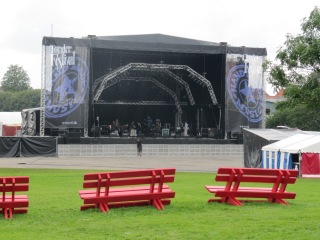
There is less traditional Irish and Scottish music than in previous years - oh please bring it back!
I was particularly interested what music would be presented on the
Open Stage.
It turns out to be mainly Danish acts thanks to being sponsored by Danmark's Radio P4.
The festival continues late into Sunday night. I overhear that
there is a lot of debate going on if these quite revolutionary changes were the step
into the right direction and if Tønder still is
my festival.
Well, time will tell. For sure, FolkWorld wishes good luck that the circle will be unbroken ...
June Tabor & the Oysterband @ Tønder Festival, 24 August 2012.
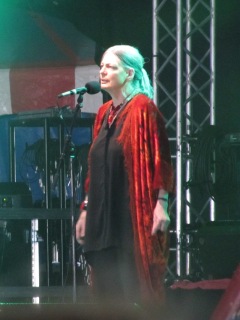 June Tabor & Oysterband:
Fountains Flowing
Mississippi Summer
Love Will Tear Us Apart
Put Out the Lights
June Tabor @ FolkWorld:
FW#1
June Tabor & Oysterband:
Fountains Flowing
Mississippi Summer
Love Will Tear Us Apart
Put Out the Lights
June Tabor @ FolkWorld:
FW#1,
#17,
#20,
#31,
#34,
#35,
#40,
#44,
#45,
#46
www.junetabor.co.uk
Oysterband @ FolkWorld:
FW#2,
#8,
#8,
#10,
#10,
#24,
#24,
#25,
#25,
#26,
#29,
#41,
#42,
#42,
#46
www.oysterband.co.uk
It seemed to me that there wasn't much of a chance to see the fruitful collaboration of
traditional English singer June Tabor with the folk-rocking Oysterband on the European mainland.
However, it came as a pleasant surprise that both were playing the Tønder Festival's main marquee
on Friday afternoon with Iain Matthews's and Julian
Dawson's[23][35]
Plainsong as support. While the latter played some run-of-the-mill Americana,
June and the Oysters explored much darker musical territory. It's British, is it?
English folk singer June Tabor had been inspired to turn her attention to traditional music and song
after listening to Anne Briggs and Belle Stewart[37]
in the mid 1960s. June developed her own unique vocal style.
First she was singing purely traditional unaccompanied ballads, before her collaboration with
Maddy Prior[44]
and a full backing band in 1976 propelled her into stardom.
June released a series of folk, jazz and art music albums, mostly
collaborating with guitarist Martin Simpson[46]
and pianist Huw Warren.
While her solo releases generally have a melancholic timbre, she did a
lavish and much celebrated folk rock album with the Oysterband in 1990, titled "Freedom and Rain."
In 2004 she sang an adaptation of Joy Division's "Love Will Tear Us Apart" with the Oysterband's singer John Jones
as part of "The Big Session."
The whole lot returned to the studio in 2011 to record the award-winning "Ragged Kingdom":
June Tabor and Oysterband won Best Traditional Song, Best Album and Best Group at the BBC Radio 2 Folk
Awards for the album, with Tabor also winning Folk Singer of the Year.
The Oysterband, formed in Canterbury in 1976, started out as a ceilidh dance band.
Later on they included reworkings of traditional standards into their repertoire,
turned into a full electric band and eventually performed almost entirely self-penned songs.
During the 1990s the quintet became one of the leading groups of the British folk rock scene,
publishing a series of critically acclaimed albums,
with John Jones[41]
and bass and cello player Ray 'Chopper'
Cooper[42]
recording equally successful solo albums.
Tonight's line-up also includes fiddler Ian Telfer, guitar player Alan Prosser and drummer Dilwyn 'Dil' Davies,
furthermore supported on bass and guitar by Al Scott, who also produced the "Ragged Kingdom" album.
The driving but gloomily arranged (no contradiction!) "Bonny Bunch of Roses" kicks off the proceedings.
This - presumably Irish, because the Irish had high hopes for anyone liberating them from the English - broadside ballad
(Roud #664) is a conversation between Napoleon's son and his mother Marie Louise. The sentiment is pro-Napoleon.
The song is frequently sung and recorded (e.g. by Bert
Lloyd[38]),
though never before with that much panache.
June Tabor's equally weathered and regal voice blends perfectly with the Oysterband's groove.
Don't know who's the next Bonaparte! she muses afterwards. Angela Merkel? Right size, wrong sex!
"Fountains Flowing" is a traditional English ballad, the tune is commonly known as "The Blacksmith."
June Tabor sang the same song as "Our Captain Cried All Hands" unaccompanied and with somewhat different verses in the 1980s.
This here is the opulent, full band rendition.
Though a melancholic song as well, it represents the musical cheerfulness of the group.
Same goes for "If My Love Loves Me" (aka "Willie's Lyke-wake," Child ballad #25)
which has a surprisingly happy ending for a traditional British ballad.
"My Son David" on the other hand introduces mindless violence, fratricide and exile.
I recall several versions of this narrative ballad (Child #13, also known as "Edward," "Lucy Wan," "Who Put the Blood" ...)
from Hedy West[46]
to Siobhan Miller[37]
and Tim Eriksen.[42]
The mother/son conversation, as delivered by John Jones and June Tabor,
is one of the most passionate.
The late 1970s pop song, Joy Division's "Love Will Tear Us Apart" has been part of their repertoire for some time.
Their version is stripped to the bone and reduced to the two, perfectly matched, voices of June and John,
a beautifully picked acoustic guitar and some poignant fiddle and cello.
"The Hills of Shiloh" is even more sparse. Tabor's vocals and some solitary guitar chords
emphasize the loneliness in Shel Silverstein's American Civil War song about the ones that stayed behind
while the men went off to the battlefield.
Written way back in 1963, the song was taken into June's and the Oyster's repertoire when they were
touring their first album in the US during the Gulf War in 1990.
"When I Was No but Sweet Sixteen," learned from the singing of the great Jeannie Robertson,
introduces the whole band back again, though only as singers.
The a capella chorale has some great harmonies.
With the latter two pieces one disadvantage of the new festival concept (see box on the left) comes to light. Everybody can attend the marquee,
and I'm probably not the only one who feels disturbed by the laughter and chatter of the indifferent ones.
We are also treated during the afternoon concert with the traditional song "Molly Bond,"
one of the first folk songs the Oysterband recorded,
and their original songs "Native Son" and "Dance as Fast as I Can".
Furthermore, Lou Reed's "All Tomorrow's Parties" about the Andy Warhol clique from Velvet Underground's 1967 debut album,
Si Khan's[42]
depressing blue-collar working song "Mississippi Summer," recorded on the Tabor-Oysterband album 20 years ago,
giving the album title Lord, send us freedom and rain!,
and finally Jefferson Airplane's psychedelic drug anthem "White Rabbit" with its
imagery taken from Lewis Carroll's "Alice in Wonderland".
Bob Dylan's "Seven Curses" finishes off a fantastic set. Thunderous applause brings them back for
the Oysterband's original song "Put Out The Lights". Ah well, this is much too early, so to speak.
It's only late in the afternoon. The dark isn't close yet, the festival has just begun, and there hopefully
will be many festivals to come. Both - June Tabor and the Oysters - are likely to return!
Photo Credits:
(1) Tønder Logo (by Tønder Festival);
(2) June Tabor,
(3)-(4) Tønder Festival area,
(6) Sorten Muld
(by Walkin' Tom);
(5) Heidi Talbot
(by Klaus Brünenkamp).
FolkWorld - Home of European Music
 Layout & Idea of FolkWorld © The Mollis - Editors of FolkWorld
Layout & Idea of FolkWorld © The Mollis - Editors of FolkWorld



